The Empresses of Constantinople by Joseph McCabe
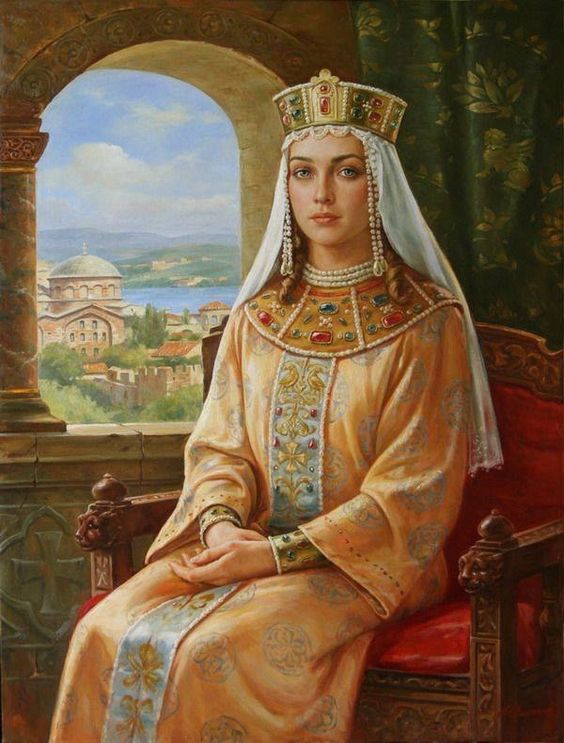 The first wife of Andronicus III., Irene of Brunswick, had died prematurely five years after her marriage. Andronicus had quickly recovered from his grief, and plunged again into his customary pleasures, but his grandfather insisted that the throne of the Empress must not remain vacant. Whatever substitute for an “Almanach de Gotha” the times afforded was scanned once more, and it was discovered that the young Count of Savoy had an eligible sister named Jeanne. The little principality, which was destined to have so important an influence on the fortunes of Europe, had only recently been carved out of the German Empire, and the name of the ruling house was in high esteem. It was still, however, a mere patch of the hills and valleys of Switzerland, and, when legates came from the Byzantine Court for the hand of Jeanne, she was readily yielded to them.
The first wife of Andronicus III., Irene of Brunswick, had died prematurely five years after her marriage. Andronicus had quickly recovered from his grief, and plunged again into his customary pleasures, but his grandfather insisted that the throne of the Empress must not remain vacant. Whatever substitute for an “Almanach de Gotha” the times afforded was scanned once more, and it was discovered that the young Count of Savoy had an eligible sister named Jeanne. The little principality, which was destined to have so important an influence on the fortunes of Europe, had only recently been carved out of the German Empire, and the name of the ruling house was in high esteem. It was still, however, a mere patch of the hills and valleys of Switzerland, and, when legates came from the Byzantine Court for the hand of Jeanne, she was readily yielded to them.
Whether Anna, as the Greeks promptly christened her, would find Constantinople equal to the reputation of its splendour that still lingered in Europe may be doubted. The majority of the gorgeous palaces in which our earlier Empresses had moved were now heaps of ruins. From the roofs of the public and imperial buildings the copper had been torn to make coin, and the marble from their facades and halls had gone to deck the palaces of Venice and Genoa. Great stretches of desolate, ruin-encumbered spaces existed within the crumbling walls, and the streets no longer glittered with a proud display of domestic treasure on the balconies as a royal cavalcade passed along. Some gold and silver299 may still have lingered in the reduced palaces before the disastrous civil war, but the display now made in the imperial households and processions was largely a display of imitation diamonds and gilded furniture. For the first time, in fact, we find Constantinople itself impressed by its visitors, even from the small Court in Savoy. The Count had sent with his sister a large escort of knights, and, as the marriage was deferred for eight months, they had ample time to exhibit their skill in tournaments. Why the marriage was postponed from February (1326) to October must be left more or less to the imagination. Cantacuzenus observes that Anna was indisposed after her journey, but one may find more enlightenment in his casual remark that Andronicus was ill and, after receiving his betrothed, went for some months into Thrace. It would probably be indelicate and impertinent to attempt a diagnosis. He returned in the autumn, married and crowned Anna, and permitted her train of knights to return to Savoy.
Since Byzantine history is too full of large and tragic matters to recount the small details of domestic life, and since the Empresses would in their early years, if they were fortunate, be confined to these small domestic interests, we pass lightly over the youth of Anna of Savoy. In the spring after their marriage she accompanied Andronicus to Didymoteichus, and would be faintly interested in the conferences of Andronicus and his mother with the King of Bulgaria. In the following year Andronicus dethroned his grandfather, and Anna found herself mistress of the Empire. The scene at Didymoteichus during the illness of her husband two years afterwards would complete her introduction to Byzantine politics, and make her realize the importance of Cantacuzenus and his friends.
Andronicus was, however, still a comparatively young man, and it was probable that he would outlive the older intriguers about him. He was only thirty-four years old at the time of his dangerous illness, and he returned to300 his boisterous sports and gaieties. In 1332 Anna, who was at Didymoteichus, gave birth to a son, and Andronicus came on the scene in a mood of wild rejoicing. His Olympic games and Western jousts alarmed and scandalized elderly ministers, who shuddered to see the sacred breast of an Emperor expanded boldly to meet a lance. But he laughed at etiquette, told his courtiers to put away the kind of silk-covered mitres that they had hitherto been compelled to wear at Court, and allowed them to have any dress or headgear they pleased. Fun and good-fellowship were his ideals. He kept, to the despair of the imperial treasurer, a vast number of hounds, horses and hawks, and there was no better way to secure a favour than to present him with a good dog or horse.
It is just to add that Andronicus made a sincere attempt to improve the administration of justice in the Empire, but apart from this one sincere and fruitless effort at reconstruction he danced down the road of death like all his frivolous subjects. A little war, the suppression of a rebellion or two, and mighty hunting and jousting filled the thirteen years of his single reign. The Turk drew nearer and nearer, and received no very serious check. The city of Nicæa had now fallen into the hands of the Turks, and the crescent flashed on the shores of the Sea of Marmora. Andronicus could do little more than trust the old Byzantine weapon—intrigue, ruse, diplomacy. His sister Anna, who had married the Prince of Epirus, assassinated her husband and invited her brother to annex the territory. His daughter Irene, who had married the Emperor of Trebizond and found him unfaithful, assassinated her husband, and sent to Andronicus for a ruler. He was endeavouring to profit by these assassinations when death overtook him. Earlier in his reign the veteran Sir Janni had rebelled. Andronicus, knowing the mettle of his opponent, had fortified and victualled the palace, where he left Anna and her boy, and gone out to the301 field; but he removed the danger in the end by deception and assassination. At length, in the early summer of 1341, Andronicus became alarmingly ill. He shrewdly put off his stained purple and retired to a monastery, in preparation for death, and he passed away on 15th June, leaving Anna with two boys of nine and four years. Then began the romance of Anna of Savoy.
The chief personæ of the romance, apart from the Empress, are the ambitious intriguers we have previously seen about the sickbed of Andronicus: the courtly and cultivated Cantacuzenus, the meaner though less hypocritical financier, Apocaucus, and the mother of Cantacuzenus. Theodora Paleologina was, as her name implies, herself a member of the Paleologi family. She was a descendant of Martha, the sister and counsellor of Michael Paleologus, the virile lady who had been put in a sack with cats by Theodore Lascaris: a strong and able and ambitious woman, although, since her husband’s death, she had worn the robe of a nun. There was a complete understanding between her and her less resolute son. Apocaucus, on the other hand, an active, restless, unscrupulous little man, who slept little at nights, was prepared to ally himself with either Anna or the Cantacuzeni, as seemed most profitable.
We have no reason to doubt the statement of Cantacuzenus that, when Andronicus lay dying, Apocaucus urged him, directly and through his mother, to seize the crown, and that he refused. He was not in the habit of acting so promptly. He went to the palace in which Anna wept with her boys, assured her that he would protect them, and placed five hundred guards about the palace. It may have occurred to Anna that there was no one, except himself, from whom they needed to be protected. Andronicus died on the following day, and she went (as Cantacuzenus would have foreseen) to spend the customary nine days in mourning by the remains of her husband. What Cantacuzenus might have done while she kept her dreary302 vigil in the monastery we cannot say, for his plans were interrupted. On the fourth day Anna surprised him by breaking the sacred custom and returning to the palace. It argues some strength of character in her that she should take this step, though it was not an original inspiration. Apocaucus had changed sides, and had gone to warn Anna that his rival aimed at the throne and she must return to watch him. But Cantacuzenus was even more surprised and baffled when the patriarch now came forward with the will of the late Emperor, and read from it that he, the patriarch, was to be guardian of the young princes and their Empire.
The maze of intrigue that followed can very well be imagined, and is fairly described in the chronicles. In fact, Gregoras and Cantacuzenus profess to give verbatim reports of the very lengthy speeches which, it seems, took the place of conversation in those days. The three aspirants to power besieged the chamber of Anna in turns, and each spent many hours in assuring her of his loyalty, and of the disloyalty of all the others. Though the strain made the Empress ill, she seems to have acted almost throughout with good judgment. The patriarch was her safest supporter, since each of the other two really aimed at the throne, and to the patriarch she clung, only tempering his advice by a fear of angering the two nobles and driving them to a coalition, which would be fatal to her. The patriarch urged her to crown her elder boy John at once; it would be an effective step, but when Cantacuzenus and Apocaucus protested that it could not be done in a time of mourning, she thought it best to refrain. At last some kind of settlement was reached. Cantacuzenus was to be the Magnus Domesticus (or “major-domo” on an imperial scale), and to lead out the troops to check the advancing Bulgarians and Turks in Thrace.
Apocaucus was dissatisfied, and, as soon as his rival had departed, he made a bold attempt to seize power. He had on the fringe of the city, by the seashore, a303 strongly fortified house, or castle, in which he could withstand an attack even of troops. It was impregnable, except to a large force, on the land side, and a galley waited always at its private wharf on the other side to convey him by sea in case of need. His plan was to carry off John to this castle and then dictate his terms to the Empress. Anna, however, was warned in time. The young prince was actually in the hands of the schemer, when her servants were sent to the rescue and Apocaucus fled to his fortress and barred the doors. Cantacuzenus returned in haste to the city, and set a troop of soldiers to watch the castle, but the Empress, on the advice of the patriarch, refused to take extreme measures. As long as the two deadly rivals were poised against each other, her position was more secure. We must not, of course, attribute this prudent policy entirely, or mainly, to the inexperienced young Empress. The patriarch was its chief author; and, though the patriarch was by no means disinterested, he could not aspire to the throne. There can be no doubt that, ill and weary as she was, Anna acted with good judgment.
Thwarted and exasperated, Cantacuzenus in his turn now meditated a coup, and it was only the singular irresolution or hypocrisy of his nature and the boldness of the patriarch that prevented it from being successful. One day, while he was discussing the situation with Anna, they heard a tumultuous rush and angry voices in the hall without. Anna asked the cause, and Cantacuzenus, professing that he did not know and going to learn, lightly reported that a crowd of soldiers and young nobles had penetrated the palace and were hectoring the patriarch. They insisted, he said, that Cantacuzenus should be allowed to enter the palace on horseback (an imperial prerogative) when he called, and the patriarch opposed them. He had, he told the Empress, scolded the patriarch for even listening to the young fools, and had driven them from the palace, and he advised the Empress to admonish or punish them. It seems quite304 clear that in this case a rather weak, but deliberate, plot on the part of Cantacuzenus had been foiled by the patriarch. The Magnus Domesticus then returned to the field, leaving his mother to watch the Empress, and threatening that he would punish any man who gave her anxiety in his absence. Gregoras says that he took with him an enormous sum of money, and we may conclude that he went with a fairly clear intention to raise the provinces.
As soon as he had removed his troops to Thrace his rivals set to work in deadly earnest. Apocaucus was pardoned, at the instance of the patriarch, and promoted to the dignity of Grand Duke and Prefect of Constantinople. So far the policy was sound enough, but it was, no doubt, impossible for the ailing young Empress to maintain the equilibrium any longer in face of their passion and the perfidy of their opponent, and they plunged into civil war. Cantacuzenus was declared to be deposed, and it was even understood in the city that the patriarch promised the open gate of heaven to any man who would assassinate him. His friends and relatives were alarmed and fled to the deserted meadows beyond the walls, where they passed the night; and, as they learned in the morning that their property had been confiscated, they hurried to the camp at Didymoteichus with loud cries of “Cantacuzenus Emperor!” After a becoming parade of real or feigned reluctance, the commander of the troops consented to accept the purple and prepared for civil war. An imperial outfit was hastily made at Didymoteichus—so hastily that, as the vain Cantacuzenus complains, the tunic was far too short, while the mantle hung about him like a sack—and the coronation took place. The ceremony gives us another Empress of a not uninteresting character. Cantacuzenus was married to Irene, daughter of a Court official of the former royal family of Bulgaria; her mother had been Irene Paleologina, daughter of Michael Paleologus and Theodora. She remained, tearful and anxious, at Didymoteichus305 while her husband led out his troops, but she would afterwards take a vigorous part in the struggle.
Irene’s mother-in-law was the first victim of her own and her son’s ambition, and of the hatred of his enemies. Cantacuzenus, who always speaks with respect, if not generosity, of Anna, tells us that the Empress was not responsible for the barbarous treatment and death of his mother. She was imprisoned in one of the palace cells as soon as the trouble began, and from her dreary room she could hear the rabble of Constantinople shouting their customary obscene abuse of her and her son, and acclaiming Anna and John V. The young prince had been crowned at once by the patriarch. It was the early winter, and the aged Theodora was treated with studied insult and severity by her jailers. Her health soon broke, and she died in the palace dungeon. Cantacuzenus relates that a royal nun who had assisted and, consoled his mother went to reprove Anna for the brutality to which she had been exposed, but he adds that Anna was ignorant of it and blameless. The close of the career of Theodora Paleologina is one of the many reminders that to the end the Byzantine Empire did not lack strong men and women; what it lacked was sound moral and patriotic feeling. The stock was not “outworn” and “enfeebled,” as historical writers are apt to say of decaying civilizations. Its strength was tainted and misdirected. The royal nun, I may add, who had visited Theodora in her cell was Theodora, daughter of Andronicus the elder, and widow of Michael of Bulgaria, who here is seen for the last time.
The course of the long civil war need not be followed here. It opened disastrously for Cantacuzenus. Anna, Cantacuzenus tells us, longed for peace, and proposed that he should hold the chief power in the Empire, though not wear the purple, and that his daughter Helena should marry her son, the Emperor John. It would have been the best settlement, but it did not suit the ambition of Apocaucus and the patriarch. Apocaucus306 urged the patriarch to live in the palace and bribed Anna’s servants to watch her day and night, in order to prevent her from communicating with Cantacuzenus. Later Cantacuzenus visited the famous monks of Mount Athos, and induced them to send a few of their community to plead with Anna to arrest this shedding of Christian blood. But the monks were intercepted by the patriarch, and converted to his view of the situation, before they reached the Empress.
After three years of indecisive warfare Apocaucus was assassinated. He had at the beginning of the war filled the palace dungeons with prisoners, and he augmented their number continually with nobles or officials who ventured to dissent from his plans. In the summer of 1345 he was building a new and formidable prison in the palace grounds, and the prisoners looked with concern on the frowning edifice and readily believed that he was going to inflict all kinds of atrocities on them. One afternoon he went, without his usual company of guards, to see how the work progressed, and imprudently entered the yard where the prisoners were. One of them snatched a heavy piece of wood and felled him, and the others, seizing the axes and tools that lay about, ended his life and exhibited his head to the guards on the other side of the wall. Anna was alarmed and perplexed, and allowed the wife of the dead minister to take a fearful vengeance. The rowers of the fleet were armed and discharged upon the prisoners, and it is said that about two hundred of them were butchered.
Cantacuzenus now sent fresh proposals of peace, which were approved by the patriarch, and Anna made the grave and somewhat obscure blunder of rejecting them. Gregoras says that she was jealous of Irene, but Gregoras, for theological reasons which will appear presently, is not generous to the Empress. It is possible that Cantacuzenus insisted on retaining his crown. However that may be, the war continued for another year, and began to turn in favour of Cantacuzenus, who307 now detached a large body of Turks from the service of the Empress. Anna’s conduct, in fact, now becomes weak and blundering. She quarrelled with the patriarch, and allowed herself to be influenced by the meaner monks and bishops who opposed him. Apocaucus had so completely relieved her of the work of administration that she paid little attention to it after his death, and, as a new heresy now entered Constantinople and won her favour, she became absorbed in a theological quarrel, while her enemy crept nearer to Constantinople.
On 2nd February 1347 Anna convoked a large gathering of bishops and monks at the Blachernæ palace. They met to judge and depose the patriarch John, who opposed the new heresy. Its tenets do not concern us, but, as it will complicate the story of the Empresses throughout the chapter, we may say that Palamism, as it was called, had discovered a plurality of “divinities” (in the sense of divine energies) in God, and its opponents retorted that this was a return to Polytheism. The discovery is said to have been made originally by some of the contemplative monks on Mount Athos, whose quaint device for raising themselves to a state of trance cannot with delicacy be described here. On this second day of February, therefore, Anna listened with delight, in her Blachernæ palace, to the heated discussion of the light which was seen on Mount Thabor and other phases of the controversy. None of the gifted seers were able to tell her that Cantacuzenus and his troops were only a few miles away, and that he had already bribed some of her soldiers to open the Golden Gate to him that very night. The patriarch was deposed, and Anna and her bishops sat down to a festive banquet and the making of “not very modest jokes,” says Gregoras, about their late archbishop. They were alarmed for a moment by a messenger who rushed in to say that Cantacuzenus and his army were approaching, but Anna concluded that this was a ruse of the patriarch, and the banquet continued merrily.
308 She was awakened in the grey dawn the next morning to hear that Cantacuzenus was master of the city. He had marched with a thousand picked men by an unaccustomed route, had been admitted by the Golden Gate at midnight, and was making for the palace. It was at once closed and fortified, and such guards as there were took up a position in its lower approaches. Anna had returned from the light on Mount Thabor to a very vigorous concern about earthly things. Cantacuzenus sent to her a proposal that she should share the imperial title with him; her name would come first in announcements and acclamations, but the real administration should be entrusted to him. She drove out his messengers angrily and abusively, and sent her servants to raise the citizens against him and bring over the Italian soldiers from Galata. There was still a good deal of loyalty to her, though her conduct during the last year had alienated many, but the troops routed her supporters and even began to storm the palace. They were recalled by Cantacuzenus, who then sent the bishops to persuade her to yield. Cantacuzenus behaved with restraint and humanity in his hour of triumph. He was, we may recall, a refined and cultivated noble, though his singular mingling of ambition and moral pretentiousness invests his conduct, and especially his words, with a repellent hypocrisy. Anna refused the mediation of the clergy, but, in the miserable night which followed, she saw the hopelessness of her position, called a council of her supporters, and decided to make peace. The prisoners were set free, and the gates of the palace thrown open. It is said that John, who was now a boy of fifteen, strongly pleaded for peace and weakened the determination of his mother.
When Cantacuzenus entered the palace he found Anna and her sons standing under a picture of the Virgin which adorned the hall. The Empress was sullen and defiant, and probably expected some vindictive action on the part of the victor, but that was never the way of the309 silken Cantacuzenus. He venerated the sacred picture, kissed the hand of the young Emperor, and swore on the Virgin that he had not, and had never had, any intention of hurting the imperial family. A general amnesty was granted, and the proposal to wed John and Helena was renewed. It was agreed between them that Cantacuzenus should have sole control of the Empire for ten years, and should relinquish it to John on his twenty-fifth birthday. These conditions were singularly moderate, and Cantacuzenus assures us that some of the troops could hardly be persuaded to subscribe to the new oath when it was found to include the name of John. Anna and John, moreover, were left in possession of the best palace, that at Blachernæ, and Cantacuzenus repaired one of the decaying palaces for himself and Irene, who was summoned from Adrianople and graciously received at the gate by Anna.
Thus two royal families settled down once more to an unstable peace on the ruins of the once mighty Empire. The coronation of Cantacuzenus and Irene, which followed on 13th May, served only to exhibit the poverty and decay of Constantinople. St Sophia was partly in ruins from the great earthquake of the previous year, and there was no money to repair it. The ceremony had to be performed in the chapel at Blachernæ, and in the banquet dishes of pewter and earthenware had to serve instead of the opulent gold and silver plate of earlier times. A week later the royal children—John was fifteen years old and Helena thirteen—were married, and a glittering group of two Emperors and three Empresses stood proudly on the balcony of the palace to receive the applause of the dwindling population; but it was commonly known that the stones which flashed from crown and mantle were almost all spurious, and that the apparent golden trappings were merely gilded leather. The treasury was empty; the nobility consisted, not of great lords of the land, but salaried officials; and the Empire that had once spread, under the Roman eagles,310 to the deserts of Arabia and the waters of the Euphrates was now restricted, on the Asiatic side, to so narrow a strip of the neighbouring coast that you could almost see from the ramparts of Constantinople the victorious crescent gleaming in the sun. On the west there still remained the greater part of what we now know as Turkey and Greece, but they were exhausted by the unceasing ravages of Turk, Servian and Bulgarian, and tens of thousands of Christian slaves passed yearly into the harems and workshops of the East.
In the midst of this desolation Cantacuzenus set up a Court of cheap and showy and incompetent dignitaries. Irene’s two brothers, John and Manuel, received the title of Sebastocrator, and were added to the imposing processions and the list of pensionaries. Money was urgently needed, and Cantacuzenus summoned to his palace all the wealthier citizens and eloquently appealed to them to fill his treasury. They refused to make the least donation. Cantacuzenus would have us admire the restraint with which he declined to extort the money from them, but we know that, if he shrewdly avoided violence, he did not scruple to obtain money in other irregular ways. A few years afterwards the Russian Church sent a large sum of money for the repairing of St Sophia, and Gregoras tells us that the Emperor appropriated it for the payment of his Turkish mercenaries. Two years later, again, when another army of Turks had to be paid to defend his throne, he seized a great quantity of the gold and silver vessels and jewels that remained in the churches and monasteries.
We may assume that Anna watched without concern the troubles that now rained upon the head of the impolitic Emperor. In the year after his coronation his son Michael was persuaded to rebel, and set up a sovereignty over part of Thrace. Irene was sent to discuss the matter with him—Gregoras gives us a six-page speech which she is supposed to have made to him—and it ended in the father leaving his son in possession,311 though without the imperial title. Anna’s supporters naturally suggested that there had been collusion between Cantacuzenus and Michael, though that is not at all certain. When Irene returned from her mission, she was pained to learn that the plague had carried off her younger son during her absence. Even greater was her pain, however, the historian says, that her husband favoured the Palamite heresy. Gregoras was one of the chief protagonists of orthodoxy against the heretics, and it will give some idea of the superfluous confusion that was brought upon the affairs of the distracted Empire if I simply observe that some five hundred pages of the remainder of his chronicle are devoted to the controversy.
To this heretical taint Irene tearfully ascribed all the calamities which affected her husband’s reign. He had hardly arranged matters in Thrace, and was still detained by illness at Didymoteichus, when he learned that the Genoese of Galata had burned the fleet which he had laboriously collected money to build, and had attacked the capital. The Genoese had for some time farmed the revenues—in plainer terms, pocketed about four-fifths of the revenues—of Constantinople, and the Emperor had endeavoured to lessen their profit. During his absence they made a raid upon the shipping and the city, and Irene is said to have shown great energy in directing the defence. For the next year or two the Bulgarians and Servians ravaged his little Empire, and the Turks, whom he hired to meet them, could be paid only by permission to loot in their turn and carry off his subjects into slavery. In these circumstances Cantacuzenus saw a tide of disaffection rising against him, and the young Emperor John began to dream of independence.
Writing years afterwards in his quiet monastic home, Cantacuzenus says that Irene and he were weary of the unprofitable conflict and were both disposed to abdicate and take the black robe; that only the recurrence of trouble in the West and the danger to the Empire kept312 them “in the world.” This statement is easily refuted by his conduct. He built, not a monastery, but a stout citadel or fortress near the Golden Gate, as if in expectation of the time when John would claim his Empire, and hired a strong guard of Turkish and Spanish soldiers. Then when the Servian outbreak in the west, of which he speaks, took place, he insisted that John should accompany him. Anna vehemently protested. The youth was too young to be left in Thessaly she said, meaning that she distrusted the Emperor. Cantacuzenus smoothly replied that it was necessary for her son’s protection; that the sultan, wrongly thinking to oblige him, had sent a eunuch to cut the youth’s throat. Anna must have felt that the eunuch, if he existed, would have an easier task in Thessaly than in the Blachernæ palace, but Cantacuzenus refused to yield, and John set out with him. John was now a good-looking and popular, if a somewhat dissolute and entirely worthless, prince of eighteen, and it would be dangerous to leave him in Constantinople. The Genoese across the water were partisans of the Paleologi.
In the course of the following year, 1351, Cantacuzenus returned to attack the Genoese, with the aid of their mortal enemies, the Venetians. As he seems to have intended from the beginning, he left John in Thessalonica, with the young Empress Helena, but he was alarmed and surprised in the following year to hear that the young Emperor was corresponding with the Kral of Servia. Gregoras says that, under pressure from the Kral, John engaged to divorce Helena and marry the Kral’s sister. When Cantacuzenus heard this, he went with Anna into the venerable chapel of the Virgin at Blachernæ, and swore that he would resign the crown to John if he would abandon the Kral and bring Helena to Constantinople. The oath was committed to writing, and Anna herself conveyed it to Thessalonica. It says something for the singular character of Cantacuzenus that they implicitly trusted his oath, and the young313 couple returned to the capital. After a few weeks, however, John distrusted his colleague and returned to Thrace with Helena. Her father seems to have tried to detach her from John, but she protested, Gregoras says, that she would “rather die with John than live with her parents.”
In return, apparently, for this fidelity John made a new compact with the Kral and received an army without abandoning his wife. He at once attacked Matthew, the Emperor’s son, in Adrianople, and let civil war loose once more upon the surviving province of the Empire; if, indeed, one can call “civil war” a contest in which hardly a single Greek soldier was enlisted. For the sake of rival Byzantine ambitions Turk fought Servian and Bulgarian on land, and Venetian fought Genoese at sea, and the decrepit Empire sank into its last stage.
The Empress Irene once more endeavoured to make peace between the combatants. She went to Thrace and laid before the young Emperor a politic and admirable scheme—admirable, at least, on the supposition that Cantacuzenus is lying when he declares that he and Irene were minded to enter a monastery, which would have been the best solution. On the other hand, John does not command our sympathy and respect. In three years’ time he would be twenty-five, and might have laid claim to the throne with perfect right and more success. Irene proposed that John and Matthew should divide the western territory, and that Cantacuzenus should hold the remainder until his death. John refused the terms, Irene returned to Court, and the Turks and Servians flew at each other.
It is only necessary to say that in a comparatively short time John and Helena were flying on ships to the island of Tenedos, and Matthew was declared Emperor. The unceasing pendulum of Byzantine Court life had now thrust the young Empress Helena into obscurity, and brought a young rival into prominence and hope of the succession. John and Helena were declared to have314 forfeited the imperial title. Matthew and Irene Paleologina (granddaughter of the elder Andronicus) were crowned in 1354. But we have hardly time to glance at the new Empress before the pendulum swings back and Helena returns to the light and the throne. Cantacuzenus was now detested by all in Constantinople. His heresy, his broken oath, his feud with the Genoese, and the consistent record of disaster during his reign, united almost every class against him. Urgent appeals were made to John to come and displace him, and it was not long before a few ships were placed at his disposal and, during an absence of the Emperor, he descended on the capital. But Irene again vigorously defended the cause of her husband, and, after sailing round the walls, firing a few harmless volleys of abuse at the partisans of the Emperor who smiled on the walls, and spending a night with the Italians at Galata, John returned in dejection to his wife and child. Then a quaint type of wealthy adventurer chanced to touch at the port of Tenedos and confer with John, and he returned to power by one of the most singular of adventures.
One stormy night in December (1354), when the Emperor slept peacefully in his palace, the soldiers who lived in the tower which guarded one of the gates by the port were awakened by a heavy crash and loud cries for help. They flung open the gate and descended the stairs, and faintly perceived a few large vessels rolling in the heavy sea. The sailors cried that one of their vessels, which were laden with jars of oil, had been dashed against the walls, and the soldiers went to the water-edge to help them to moor the vessels. Scores of armed men then rushed from the holds, killed the guards, and occupied the tower; and before the citizens could grasp what was happening, the enterprising Genoese had lodged John in the tower, and were marching through the streets at the head of two thousand men, crying “Long live the Emperor John!” The citizens swarmed to the Hippodrome in the faint morning light,315 repeating the cry, and Cantacuzenus was awakened to hear that his enemy was in the city with an army.
It is worth while giving the explanation of this remarkable change in the fortunes of John and Helena. Their vigorous and resourceful ally was a Genoese noble of some wealth, who, with a small fleet, had sailed east in the hope of securing some fragments of the dismembered Empire. John offered him the island of Lesbos and the hand of his sister Maria if he would help him to gain the throne, and he consented. Two large triremes (galleys with two banks of oars) and sixteen uniremes (with one bank of oars) were not the kind of fleet one needed to carry Constantinople by storm, but Francesco Gattilusio was a strategist. He emptied the oil from the vessels on one of his boats, crept up to the wall in the darkness, and bade the sailors fling the great jars against the wall. This was the noise that awakened the warders of the tower by the quay, and the stratagem succeeded as happily as in a romance. I may add that John afterwards carried out his compact, and Gattilusio became Prince of Lesbos and brother-in-law of the Emperor.
Cantacuzenus did not venture from his palace. He explains that he could easily have scattered the intruders, which is probably more true than he knew at the time, but he conferred with Irene and they decided that the time had come to enter a monastery. Gregoras says that he was afraid to leave the palace, and, as he was isolated from his citadel by the Golden Gate and would hardly know the strength of his opponent, one prefers this explanation. He was by no means anxious to enter a monastery. Drawing up his guards at the entrance to the palace, he entered into negotiations with John and succeeded in getting a promise that the imperial power would be divided. That solution, however, did not please the people, and for several days he was assailed with abuse and threats. He yielded to the “voice of God,” abdicated his dignity, and, under the name of Joasaph, retired to the monastic world, to write his316 flowing and elegant and mendacious chronicle of his times. Irene was now forced to take the veil, and her robust personality was converted into the black-robed figure of the royal nun Eugenia. We do not know when she died, but some years later we find her, in her monastery, guiding the education of her granddaughter, Theodora. Theodora’s parents, Matthew and Irene, continued the civil war for two or three years, but Matthew was then captured and was sent, with his ex-Empress, to spend the remainder of their lives in the island to which they had driven John and Helena.
Helena had followed her victorious husband and, with warm and mutual embraces, joined him at the palace. We do not know how long she lived to enjoy her fortune. I find no further reference to her. Anna is not mentioned further in the Byzantine chronicles, but a little more may be gleaned about her from Italian writers. Du Cange quotes the Franciscan historian, Luke Wadding, as saying that she died about the year 1350, and her body was transferred for burial to the shrine of St Francis of Assisi, for whom she had had a great veneration. I do not find this in Wadding—the reference, at least, is wrong—but Wadding does in other pages (at the years 1343 and 1349) refer to Anna. In 1343 she sent a Franciscan monk from the convent at Pera to confer with the Pope in regard to the union of the Latin and Greek Churches. It is clear that she remained Latin at heart, and no doubt she had brought with her from the West a veneration for the gentle saint of Assisi. Then the civil war and the triumph of Cantacuzenus put an end for a time to the project of union, but the correspondence was renewed in 1349. From a reference to her in one of the Pope’s letters we may deduce that she still lived in Constantinople in 1349, and it is the last reference. An Italian writer says that she died in that year, but I am unable to find in Wadding’s “Annales” the statement that she was buried at Assisi.
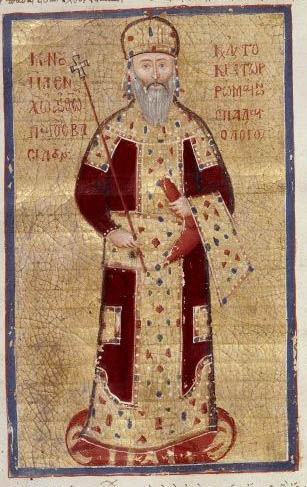 “Show me just what Muhammed brought that was new and there you will find things only evil and inhuman, such as his command to spread by the sword the faith he preached.”
“Show me just what Muhammed brought that was new and there you will find things only evil and inhuman, such as his command to spread by the sword the faith he preached.”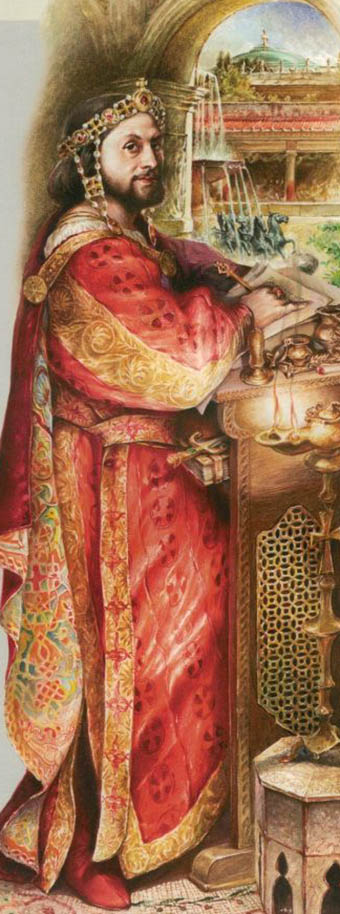
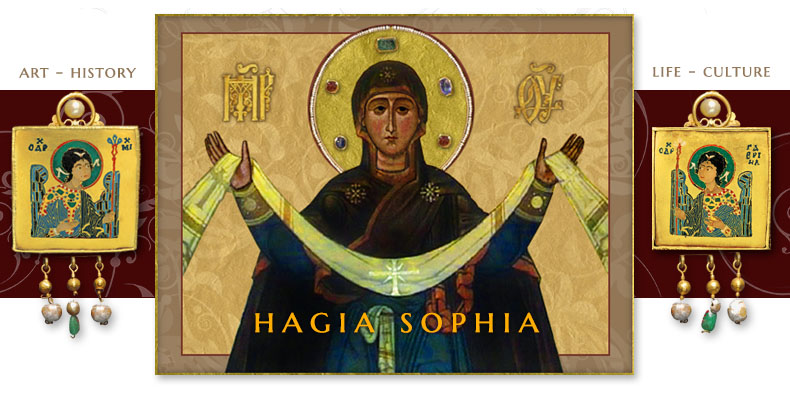
 The
The

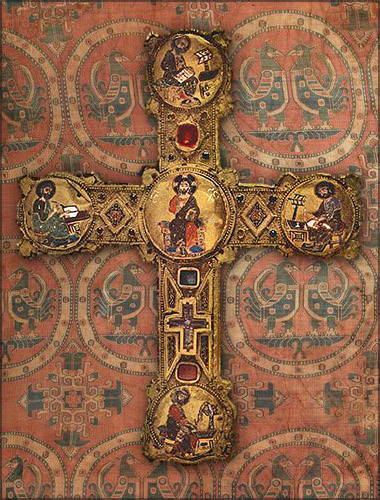

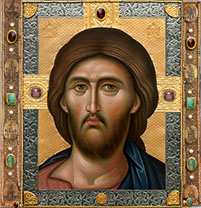 click here for icons of christ
click here for icons of christ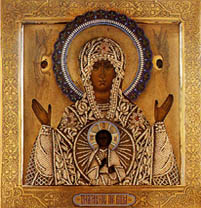 click here for icons of the theotokos
click here for icons of the theotokos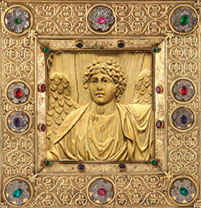 click here for icons of angels
click here for icons of angels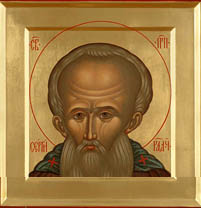 click here for icons of saints
click here for icons of saints








